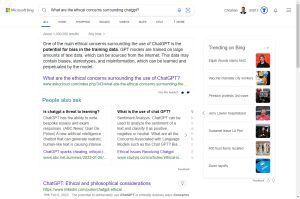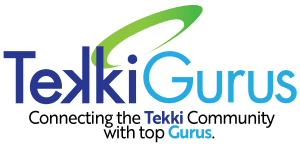The New, Improved Bing
Despite years of investment by Microsoft, Bing has been a minor internet search engine since its inception in 2009. However, with the integration of new artificial intelligence capabilities, Bing is working hard to stay competitive with Google and Yahoo search engines.
As announced by Yusuf Mehdi, Microsoft CVP & Consumer Chief Marketing Officer, the new Bing search experience launched today. The inclusion of ChatGPT technology provides Bing with a powerful AI-driven solution for natural language query completion and understanding. This means that Bing users can now experience more accurate searches than ever before. Whether performing simple searches or complex queries, Bing’s ChatGPT algorithms ensure that users receive the most relevant results quickly and accurately.

Exploring the new Bing results
Microsoft has also incorporated many new features into this recent version of their search engine. For instance, Bing now allows users to customize their experience by creating personalized news feeds, display content from over 200 countries, and provide more detailed images with each result. Using machine learning models, Bing’s AI algorithm becomes better at personalizing the data as it continues to receive more usage data from millions of users worldwide. Additionally, Microsoft recently launched their Knowledge Graph feature which will help to reduce the risk of false positives by providing an organized view of related entities found within webpages and other forms of media.
Bing remains a strong contender in the world of search engines, despite some user feedback claiming otherwise. Built on top-of-the-line technology such as ChatGPT and sophisticated learning models, Microsoft looks to further grow its market share against tough competition from Google search engines and others. In addition to providing enhanced accuracy in searches, Microsoft also plans to continue adding innovative features like personalized news feeds in order to keep up with the latest trends in online searching experiences.
Overall, Microsoft looks poised to continue pushing forward in its effort against Google search by relying heavily on its cutting-edge AI capabilities through ChatGPT technology—a strategy that should bring increased accuracy and customization options for users worldwide when searching online with Bing.
Hey Google, It’s Your Move
Google is responding to Bing’s integration of ChatGPT with caution. Analysts are split in their opinion, with some questioning the effectiveness of ChatGPT and its ability to hold its own against Google’s search engine. The company has made clear that it is watching the development of Microsoft’s AI-driven platform closely.
Google has continued to invest heavily in its own AI capabilities, adding features such as conversational search to enhance the user experience and improve accuracy of searches. In an announcement yesterday, Google introduced their own AI solution which they call Bard. Clearly, the company is not willing to sit back and let its competition gain ground without taking action. Google’s announcement of a collaboration agreement between their DeepMind subsidiary and OpenAI was seen as an effort to stay one step ahead of Bing’s new technology.
The competition between Microsoft and Google for dominance in internet search technology is likely to intensify over time, given the stakes involved for both companies. With each side committed to leveraging their respective artificial intelligence capabilities, it remains unclear which organization will come out on top as consumer demand shifts towards more customized experiences online.
The End User Wins
The introduction of AI into search will have a profound impact on the end user, providing all of us with an even more engaging and trustworthy searching experience. AI’s ability to understand natural language queries and interpret context allows it to provide highly tailored search results that are more accurate than traditional keyword-based searches.
AI also works to continuously learn and refine its search capabilities over time, improving accuracy as it processes more data. As a result, users can expect better results every time they conduct a query on a search engine powered by AI.
While there are some valid ethical and bias concerns, the introduction of AI into search can (in theory) also help reduce unintentional bias in results and suggests related topics that may otherwise have been overlooked by the user. Furthermore, AI-driven searches may be able to detect certain patterns that indicate malicious activity or intent, allowing users to feel secure when using the internet for their daily activities.
In summary, the introduction of AI into search provides a vast array of benefits for end users looking for accurate and meaningful results from their queries. From improved accuracy due to natural language processing capabilities, to enhanced security measures and decreased bias in results, the advantages provided by this technology are undeniable. I’m excited to use both Bing and Google solutions going forward and follow the advances in search, and will share some of my takeaways in the future.





1 Response
[…] The New, Improved Bing [blog] […]